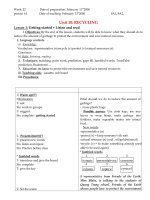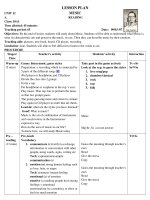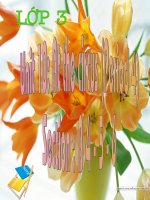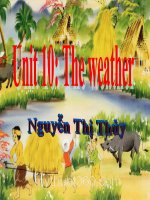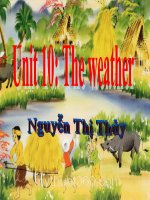unit 10 lớp 10 (xem ma học hỏi)
Bạn đang xem bản rút gọn của tài liệu. Xem và tải ngay bản đầy đủ của tài liệu tại đây (623.68 KB, 15 trang )
I. WARM-UP
GAME: PELMANISM
II. PRE-READING
1) Vocabulary
1. Eliminate / ɪˈlɪm
i/
∂
neɪt / (v)
2. Hydroelectric /haɪdrəʊ-ɪˈlektrɪk/ (a)
hydroelectricity (n)
3. Circulation / sɜːkj
u/
∂
ˈleɪʆ∂n / (n)
circulate (v)
4. Run-off /ˈrΛnɒːf / (n)
5. Worsen /ˈwɜːs∂n/ (v)
≠ improve
6. Defence /dɪˈfens/ (n) = defense (US)
defend (v) (against, from)
defensive (a) có tính chất phòng thủ
defendable (a) có thể phòng thủ bảo
hộ
defendant (n. person) người bị cáo
7. Erosion / ɪˈrəʊʒ∂n/ (n)
erode (v) destroy gradually, wear
away
To completely get rid of something
that is unnecessary or unwanted:
Using water power to produce
electricity
ex: Thac Mo hydroelectric dam
The movement of liquid, air etc in a
system
Rain or other liquid that flows off the
land into rivers
To become worse or make something
worse
The act of protecting something or
someone from attack
ex: The defense of human rights
civil defence
The process by which rock or soil is
gradually destroyed by wind, rain, or
the sea
2) checking: RUB OUT AND REMEMBER
III. WHILE-READING
1. Listening and skimming ( & )
Listen and skim the paragraphs
A. The loss of forest is destroying the earth’s plant and animal variety. Scientists
say about 5,000 species of plants and animals are eliminated each year. This is
specially worrying as many of those plants and animals could be used as
medicines against cancer, AIDS, heart disease and many others sicknesses.
We may never know the true cost of this destruction.
B. Man and most animals need a constant supply of water to live. Farmers need
water for their crops. Hydroelectric dams hold back needed water and
provide power for homes and industries. Trees, gasses, and other plant life
play an important part in the natural circulation of water, and thus help
conserve it. Without plants, most water would run off as soon as it falls, taking
away valuable soil. Rapid run-off would cause frequent floods and leave little
water during dry seasons.
C. These days it is impossible to open a newspaper without reading about the
damage we are doing to the environment. The earth is being threatened and
the future looks bad. What can each of us do? We cannot clean up our
polluted rivers and seas overnight. Nor can we stop the disappearance of
plants and animals. But we can stop worsening the problem while scientists
search for answers, and laws are passed in nature’s defence.
2. Task 1. Matching
Match the words in column A with the suitable definitions in column B
1. eliminate
2. circulation
3. run-off
4. hydroelectric
5. erosion
a. the movement of something around
closed system
b. the process by which rock or soil is
gradually destroyed by wind, rain, or
the sea
c. concerning or producing electricity
by the power of falling water
d. remove or get rid of completely
e. liquid which flows off or from
(something)
3. Task 2. T/F Statement
Decide whether the following statements are true (T) or false (F)
Statements T F
1. Each year about fifty hundred species of plants and animals
are eliminated.
2. Many kinds of plants could be used to treat various
dangerous diseases.
3. Man is constantly doing harm to the environment.
4. Water can be help on land by vegetation.
5. Plants may cause floods and erosion.
6. We can do nothing to save the earth.
4. Task 3. Topic Sentences
1. We cannot live without water.
2. Let’s do something to save the earth.
3. Forests give us a lot of valuable things.
4. Vegetation can help conserve water.
IV. POST-RAEDING
Discuss: How do you think about the losing forest, water in our life? Give your ideas
for best solution.
Suggest: The losing forest: plant and animal have been eliminated/ disappeared
forever including the precious plants and animals
Quotation
Water in our life: the importance in people, animal, vegetation
Quotation
Solution: Do not continue worsening the polluted problem
Ask the government of countries to pass the laws of nature’s
defence….
HOMEWORK
Reading complement
Evaluation
**THE END**
LESSON PLAN
UNIT10 CONSERVATION
C. LISTENING
Class: 10A1
Time allotted: 45 minutes
Teaching period: 55 Date: 07/02 /07
Objectives: By the end of this lesson, students will be able to improve the listening skill more. Students will listen in
detail to solve tasks in the textbook about the forest fire. Student will also know the damage of a forest fire and then
be aware of fire when camp firing.
Teaching aids: CD player, text book, posters
Limitation: Time is limited.
PROCEDURE
Stages/time Teachers’ activity Student’s activity
Interaction
Warm-up
5 mins
Game: joining picture
Prepare: 2 posters which are cut into many
pieces about a forest fire
Divide the class into 2 groups
Give each group one poster
Ask students to join/ connect
The group which finishes sooner and
correctly is winner.
Lead-in: look at the poster, what is
happening in?
Yes, have you ever seen or heard any forest
fire?
Is this terrible?
Today you will listen to a passage about a
forest fire, and you will see why are you
forbidden to fire/burn in the forest
Take part in the game actively
Gather each other to join the poster
A forest is firing
Yes (maybe only see)
Yes, too terrible
SsSs
Pre-
listening
7 mins
Pre-teach
Vocabulary
1. forester (n) someone who works in a
forest taking care of, planting, and
cutting down the trees
2. heap (n) a large untidy pile of things
ex: rubbish heap, heap of leaves
3. leaf (n) plural noun: leaves
4. awful (a) terrible, unpleasant
5. value (n) valuable
ex: valuable wood,
6. soil (n) earth
Check: chorally
Do as told
Do as told
TSs
While-
speaking
28 mins
Task 1: listen and number the events in
the order you hear (10 mins)
Ask Sts to read fast these sentences and
remember the facts/events of each sentence
For example: the first sentence: a heap of
leaves
Play the CD player three times in turn
Check: the whole class
Give feedback
First: 3 second: 2 third: 5 fourth: 1 fifth: 4
Task 2: T/F statements (10 mins)
Ask Sts. to read the sentences and give the
key words/phrases
Play CD player again 3 times in turn
Check: call each student for one sentence
Ask what student hears
Feedback:
1. F (spread quickly)
2. F (summer)
3. T
4. T
5. F (camper)
Task 3: tick () the sentences you hear
(8 mins)
Ask Sts. to read all pairs of three sentences
Note the words added more than the rest
Play CD player again 2 times in turn
Check:
Give feedback
1.a 2.b 3.a
Read fast the sentences
Line the words looked as an important
fact
First sentence:
Second: summer, not allowed (to go)
Third: care, save
Fourth: unpleasant (awful)
Fifth: destroy, valuable (wood, wife
life)
Correct
Read and five the key words/phrases
1. (fire) takes time
2. autumn, catch fire
3. put out ( daäp taét)
4. difficult
5. forester
Listen again three times in turn
Read and then listen
Line the words which are added more
than the rest
1. a. destroyed, by
2. a. spreads/ b. awful, see
3. dry a, they/ b. woods, forests
TSs
Post-
listening
5 mins
List the words which a camper must
remember when he/she wants to fire in
the forest and consequences of this
campfire
Work in pair
Check: call on 1 or 2 pairs to stand up and
talk
Others listen and contribute
Add and correct if necessary
Home work:
Study again the vocabulary and remember
the words for a camper
Prepare Writing part
Work in pair
Share the information and give the
consequences
Do ask told
Others listen and contribute
SsSs
Signature of the chief of English team
